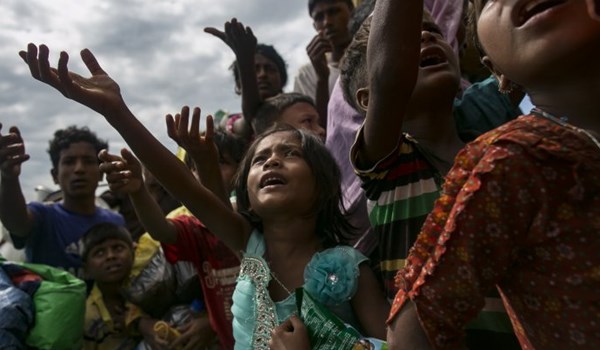
RNA - The UNICEF said on Friday that preliminary data showed that a full 7.5 percent of the children crammed into one of the camps in Bangladeshi district of Cox's Bazar face the risk of dying from severe acute malnutrition.
More than 600,000 Rohingya Muslims have so far fled the predominantly-Buddhist Myanmar to neighboring Bangladesh since August 25, when the crackdown on the Rohingya intensified in Rakhine state. Around half of them are children.
"It's very worrying to see the condition of children who keep arriving," UNICEF spokesman Christophe Boulierac, who recently visited the camps, told reporters in Geneva.
More than 2,000 acutely malnourished children are already receiving treatment at 15 treatment centers by the agency and its partners, who are in the process of establishing six additional centers.
The UN children's agency said its preliminary data were based on a nutrition assessment carried out last week of children under the age of five in 405 households in the Kutupalong refugee camp in Cox's Bazar.
"The Rohingya children in the camp, who have survived horrors in Myanmar's northern Rakhine State and a dangerous journey here, are already caught up in a catastrophe," UNICEF Bangladesh Representative Edouard Beigbeder said in a statement.
"Those with severe malnutrition are now at risk of dying from an entirely preventable and treatable cause," he warned.
Malnutrition rates among children in northern Rakhine were already above emergency thresholds before the latest wave of violence.
"The condition of these children has further deteriorated due to the long journey across the border and the conditions in the camps," the statement noted.
The UNICEF stressed that the refugees in the Kutupalong camp are faced with an acute shortage of food and water, unsanitary conditions and high rates of diarrhoea and respiratory infections.
Boulierac estimates that the overall rate of severe acute malnutrition could be higher as it was planning to conduct two additional assessments in other sites in Cox's Bazar this month.
Beigbeder also called for more resources to cope with the humanitarian crisis amid a continuing influx of refugees.
"We need far more attention to the crisis, and far more resources for the response," Beigbeder said, emphasizing that "these children need help right now."
The massive exodus of distressed Muslims in Rakhine has also altered the demographic status of the state, where the military and Buddhist mobs have since last year been attacking Muslim Rohingya civilians.
Many of those who have fled have recounted harrowing accounts of rape, murder, and arson at the hands of Myanmar’s forces and Buddhist mobs, in what has been branded “an ethnic cleansing campaign” against the Muslim minority group.
847/940